- Clone
- RMT4-54 (See other available formats)
- Regulatory Status
- RUO
- Other Names
- T cell immunoglobulin and mucin domain containing protein-4
- Isotype
- Rat IgG2a, κ
- Ave. Rating
- Submit a Review
- Product Citations
- 5 publications
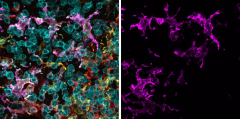
Tim-4 is a transmembrane protein known as T cell immunoglobulin and mucin domain containing protein-4. It is expressed on antigen-presenting cells and not on T cells. Tim-4 binds to Tim-1 to promote T cell proliferation by enhancing cell division and reducing apoptosis. Tim-4 bind to phosphatidylserine through its FG-CC’ binding cleft in the N-terminal IgV domain to facilitate the clearance of apoptotic cells or bodies.
Product DetailsProduct Details
- Verified Reactivity
- Mouse
- Antibody Type
- Monoclonal
- Host Species
- Rat
- Immunogen
- Mouse TIM4-Ig fusion protein
- Formulation
- Phosphate-buffered solution, pH 7.2, containing 0.09% sodium azide.
- Preparation
- The antibody was purified by affinity chromatography.
- Concentration
- 0.5 mg/ml
- Storage & Handling
- The antibody solution should be stored undiluted between 2°C and 8°C.
- Application
-
FC - Quality tested
IHC-F - Customer reported
FA, Block - Reported in the literature, not verified in house - Recommended Usage
-
Each lot of this antibody is quality control tested by immunofluorescent staining with flow cytometric analysis. For flow cytometric staining, the suggested use of this reagent is ≤0.25 µg per million cells in 100 µl volume. It is recommended that the reagent be titrated for optimal performance for each application.
- Application Notes
-
Additional reported applications (for the relevant formats of this clone) include: in vivo induction of auto-antibody production1 and blockade of dendritic cell Tim-42.
-
Application References
(PubMed link indicates BioLegend citation) -
- Nakayama M, et al. 2009. Blood. 113:3821. (FA)
- Yeung MY, et al. 2013. J. Immunol. 191:4447. (Block)
- Product Citations
-
- RRID
-
AB_1227802 (BioLegend Cat. No. 130002)
Antigen Details
- Structure
- Transmembrane protein containing immunoglobulin domain and mucin-like domain
- Distribution
-
Unlike the other Tims, Tim-4 is only expressed by antigen-presenting cells, but not by T cells.
- Function
- Tim-4 is expressed on antigen-presenting cells. It provides co-stimulation to promote T cell proliferation and survival and has a possible role in clearance of apoptotic cells by binding phosphatidylserine.
- Interaction
- Phosphatiylserine is the ligand of Tim-4 and Tim-4 is a ligand of Tim-1.
- Ligand/Receptor
- Phosphatidylserine, TIM1
- Cell Type
- Antigen-presenting cells
- Biology Area
- Immunology
- Antigen References
-
1. Kuchroo VK, et al. 2008. Nat. Rev. Immunol. 8:577
2. Miyanishi M, et al. 2007. Nature 450:435
3. Rodriguez-Manzanet R, et al. 2008. J. Immunol. 180:4706 - Gene ID
- 276891 View all products for this Gene ID
- UniProt
- View information about Tim-4 on UniProt.org
Related FAQs
Other Formats
View All Tim-4 Reagents Request Custom Conjugation| Description | Clone | Applications |
|---|---|---|
| Purified anti-mouse Tim-4 | RMT4-54 | FC,FA,Block |
| PE anti-mouse Tim-4 | RMT4-54 | FC |
| Alexa Fluor® 647 anti-mouse Tim-4 | RMT4-54 | FC |
| PE/Cyanine7 anti-mouse Tim-4 | RMT4-54 | FC |
| TotalSeq™-A0567 anti-mouse Tim-4 | RMT4-54 | PG |
| Ultra-LEAF™ Purified anti-mouse Tim-4 | RMT4-54 | FC,FA,Block |
| PerCP/Cyanine5.5 anti-mouse Tim-4 | RMT4-54 | FC |
| TotalSeq™-C0567 anti-mouse Tim-4 | RMT4-54 | PG |
| TotalSeq™-B0567 anti-mouse Tim-4 | RMT4-54 | PG |
| APC anti-mouse Tim-4 | RMT4-54 | FC |
Customers Also Purchased

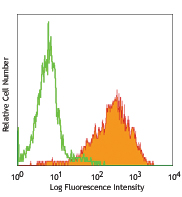
Compare Data Across All Formats
This data display is provided for general comparisons between formats.
Your actual data may vary due to variations in samples, target cells, instruments and their settings, staining conditions, and other factors.
If you need assistance with selecting the best format contact our expert technical support team.
-
Purified anti-mouse Tim-4

Peyer’s patches of a CX3CR1-GFP -/+ mouse were fi... -
PE anti-mouse Tim-4
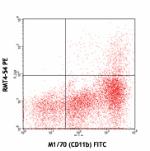
BALB/c peritoneal macrophages stained with RMT4-54 PE and M1... -
Alexa Fluor® 647 anti-mouse Tim-4
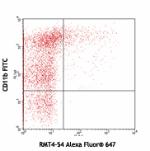
Balb/c mouse peritoneal macrophages stained with RMT4-54 Ale... -
PE/Cyanine7 anti-mouse Tim-4

Balb/c peritoneal macrophages were stained with CD11b APC an... -
TotalSeq™-A0567 anti-mouse Tim-4
-
Ultra-LEAF™ Purified anti-mouse Tim-4
-
PerCP/Cyanine5.5 anti-mouse Tim-4

Thioglycolate-elicited Balb/c mouse peritoneal macrophages w... -
TotalSeq™-C0567 anti-mouse Tim-4
-
TotalSeq™-B0567 anti-mouse Tim-4
-
APC anti-mouse Tim-4

Thioglycolate-elicited Balb/c mouse peritoneal macrophages w...







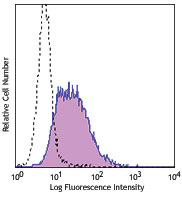







Follow Us